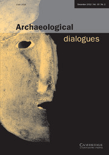
Archaeological Dialogues
Scope & Guideline
Advancing Archaeological Scholarship with Impact
Introduction
Aims and Scopes
- Interdisciplinary Approaches:
The journal encourages the integration of diverse disciplines, such as anthropology, sociology, and cultural studies, to enrich archaeological research and provide broader insights into human pasts. - Ethics and Social Responsibility:
A consistent focus on ethical considerations in archaeology, particularly in post-conflict and colonial contexts, reflecting a commitment to social justice and the responsible stewardship of cultural heritage. - Cultural Narratives and Identity:
Exploration of how archaeology can inform and shape narratives of identity, including discussions on Indigenous frameworks and the implications of historical injustices. - Playful and Engaged Archaeology:
An emerging area that examines the role of play and engagement in archaeological practice, advocating for more accessible and enjoyable approaches to archaeology. - Global and Local Interactions:
Research that examines the interplay between global trends and local practices, particularly in the context of cultural heritage and archaeological interpretation.
Trending and Emerging
- Playful Archaeology:
An increasing interest in 'playful archaeology' suggests a trend towards making the discipline more engaging and accessible, encouraging public participation and enjoyment in archaeological practices. - Post-Colonial and Decolonizing Frameworks:
There is a growing emphasis on post-colonial perspectives and decolonization within archaeology, reflecting a critical examination of the discipline's historical roots and its impact on marginalized communities. - Anthropocene and Non-Anthropocentric Perspectives:
The exploration of archaeology's role in the Anthropocene marks a significant trend, focusing on the relationship between humans and the environment while considering non-anthropocentric viewpoints. - Indigenous Knowledge Systems:
An increasing integration of Indigenous conceptual frameworks and methodologies represents a shift towards valuing diverse epistemologies and recognizing the importance of local knowledge in archaeological research. - Globalization and Cultural Interactions:
Emerging themes around globalization and its effects on cultural practices and archaeological interpretation highlight the interconnectedness of past societies and contemporary issues.
Declining or Waning
- Traditional Archaeological Methodologies:
There is a noticeable decline in papers focusing solely on traditional excavation and artifact analysis, as the journal increasingly emphasizes theoretical discussions and interdisciplinary methods. - Eurocentric Perspectives:
Themes centered on Eurocentric archaeological narratives are becoming less prevalent, indicating a shift towards more inclusive and diverse perspectives that challenge historical biases. - Strictly Historical Narratives:
The focus on linear historical narratives is waning, with more emphasis on complex, multifaceted understandings of the past that incorporate various cultural and social dimensions.
Similar Journals
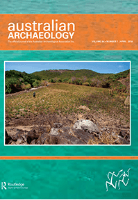
AUSTRALIAN ARCHAEOLOGY
Advancing the Frontiers of Archaeological Knowledge.AUSTRAILIAN ARCHAEOLOGY, published by Taylor & Francis Ltd, is a leading academic journal dedicated to the field of archaeology. With a strong reputation as evidenced by its Q1 ranking in both the Arts and Humanities and Social Sciences categories, this journal fosters the growth and dissemination of pioneering research from diverse archaeological contexts. The journal has been a vital resource for scholars and practitioners since its convergence in 2002, supporting the collective advancement of knowledge in the archaeological discipline. By offering a platform for rigorous analysis and critical discussions, AUSTRAILIAN ARCHAEOLOGY appeals to a wide audience, from established researchers to students beginning their journey in archaeology. Although it is not an Open Access journal, the insights provided are invaluable for enhancing understanding and appreciation of Australia’s rich archaeological heritage. With a Scopus ranking that places it among the top contenders in its field, this journal continues to contribute significantly to outstanding archaeological scholarship and professional practice.
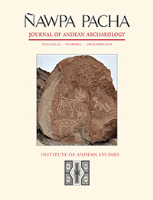
Nawpa Pacha
Innovating Methodologies for Modern Archaeological Challenges.Nawpa Pacha, a prestigious journal published by Taylor & Francis Ltd, stands as a significant platform for advancing research in Archaeology within the fields of Arts and Humanities. Since its inception in 2019, it has rapidly established itself with an impressive impact, evidenced by its categorization in the Q1 quartile for Archaeology and its significant rankings—placing it at Rank #88 in the Arts and Humanities category and Rank #86 in the Social Sciences. Published in the United Kingdom, the journal aims to foster interdisciplinary dialogue and promote scholarly work that contributes to the understanding of archaeological heritage and practices. Researchers, professionals, and students alike will find this journal indispensable for disseminating innovative methodologies, theoretical frameworks, and case studies that push the boundaries of archaeological inquiry. Whether seeking to explore historical narratives or contemporary archaeological challenges, Nawpa Pacha serves as a vital resource in the ever-evolving landscape of archaeological research.

Archaeologies-Journal of the World Archaeological Congress
Fostering Dialogue on Humanity's HeritageArchaeologies: Journal of the World Archaeological Congress is a premier academic journal published by Springer, focusing on the dynamic and interdisciplinary field of archaeology. With an ISSN of 1555-8622 and an E-ISSN of 1935-3987, this journal serves as a significant platform for the dissemination of innovative research, theory, and practice within the archaeological community. Hailed for its rigorous peer-review process, Archaeologies consistently ranks in the 74th percentile among its peers, currently holding a Q2 category placement in the field of archaeology as per the 2023 Scopus rankings. The journal publishes original articles, critical essays, and case studies that emphasize the cultural, historical, and methodological aspects of archaeological research from a global perspective. As a key resource for researchers, professionals, and students alike, Archaeologies facilitates critical dialogue and enhances understanding of humanity's past through archaeology. Although the journal is not open access, it provides various subscription options to ensure its valuable content remains accessible to its diverse audience.
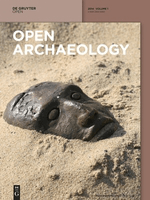
Open Archaeology
Transforming Archaeological Research into Global KnowledgeOpen Archaeology is a distinguished open-access journal dedicated to publishing high-quality research in the fields of archaeology, conservation, and education. Since its inception in 2015, the journal has established itself under the esteemed publication of DE GRUYTER POLAND SP Z O O, experiencing rapid growth and recognition, culminating in a Q1 ranking in both Archaeology and Conservation categories as of 2023. Based in the vibrant academic environment of Poland, Open Archaeology caters to a global audience, illustrated by its Scopus rankings which position it 16th in Conservation and 69th in Archaeology, showcasing its significant impact in the arts and humanities sphere. The journal aims to foster interdisciplinary discourse and disseminate innovative research findings to enhance understanding and preservation of cultural heritage. With an unwavering commitment to open access, it encourages widespread dissemination of knowledge, making it an invaluable resource for researchers, professionals, and students alike.
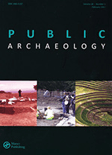
Public Archaeology
Transforming Archaeology into a Community ConversationPublic Archaeology is a leading journal in the field of archaeology, published by Routledge Journals, Taylor & Francis Ltd in the United Kingdom. Established in 2004, this journal focuses on the interaction between archaeology and the public, providing a platform for discussions that bridge academic research and community engagement. With an impressive impact factor and ranked in the Q2 quartile for both Arts and Humanities and Social Sciences archaeology categories, it holds a prominent position as one of the top journals in its field, reflecting the high caliber of its published work. Researchers, professionals, and students alike will find valuable insights through its comprehensive articles and case studies that explore contemporary issues within archaeology and the implications of these on society. Despite not being openly accessible, the journal has established itself as an essential resource for innovative research and dialogue, making it an invaluable asset for anyone interested in the dynamic field of public archaeology.

Afriques-Debats Methodes et Terrains d Histoire
Advancing Critical Debates in African HistoryAfriques-Debats Méthodes et Terrains d’Histoire is a distinguished academic journal dedicated to the field of history with a particular focus on the diverse narratives and methodologies associated with African contexts. Published by INST MONDES AFRICAINS in France, this Open Access journal has been at the forefront of historical discourse since 2010, allowing unrestricted access to its scholarly content. With an impressive Q3 ranking in the History category as of 2023, and a relevant position within the Scopus ranking system, the journal serves as a vital platform for researchers, professionals, and students aiming to explore and contribute to the multifaceted study of African history. The journal's commitment to promoting critical debates and innovative methodologies positions it as an essential resource in the academic landscape, particularly for those interested in the intersection of history, culture, and society in Africa.
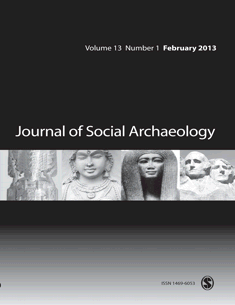
JOURNAL OF SOCIAL ARCHAEOLOGY
Challenging Narratives, Enriching PerspectivesJOURNAL OF SOCIAL ARCHAEOLOGY, published by SAGE Publications Ltd, stands at the forefront of interdisciplinary research where archaeology meets social science. With an ISSN of 1469-6053 and an E-ISSN of 1741-2951, this esteemed journal provides a platform for investigation into the social dimensions of past human behaviors and interactions. Since its inception in 2001, it has garnered substantial recognition, currently ranked in the Q1 quartile in both Archaeology and Arts and Humanities (miscellaneous) categories for 2023, positioning it among the top-tier journals within these fields. Additionally, its Scopus rankings, where it holds a notable placement of #35/354 in Social Sciences and #124/552 in Arts and Humanities, underscore its significant impact, falling within the 90th and 77th percentiles, respectively. The journal aims to foster innovative research that challenges traditional archaeological narratives and enriches our understanding of the social constructs and cultural contexts of the past. Although not open access, JOURNAL OF SOCIAL ARCHAEOLOGY remains an essential resource for scholars, professionals, and students dedicated to unlocking the complexities of human history through a social lens.

Revista de Arqueologia Historica Argentina y Latinoamericana
Fostering Interdisciplinary Dialogues in Archaeological ScholarshipRevista de Arqueologia Historica Argentina y Latinoamericana is a vital scholarly journal dedicated to the field of archaeology, with a particular focus on the historical dimensions of Argentina and Latin America. Published by the Assoc Professional Archaeologists Argentine Republic, this open-access journal has been enriching the archaeological discourse since 2007, making its valuable content freely accessible to researchers, professionals, and students around the globe. With an ISSN of 1851-3190 and an E-ISSN of 2344-9918, the journal aims to foster a deeper understanding of the archaeological heritage of the region by publishing innovative research articles, critical reviews, and methodological advancements in the study of historical archaeology. Positioned as a prominent platform for scholarship, it plays a crucial role in advancing archaeological knowledge while promoting interdisciplinary approaches within the field.

ARCHAEOLOGY IN OCEANIA
Shaping the Future of Archaeology in OceaniaARCHAEOLOGY IN OCEANIA, published by Wiley, is a leading journal that delves into the rich and diverse archaeological landscape of the Pacific region. With a commitment to advancing knowledge in anthropology and archaeology, this esteemed publication has been pivotal in shaping scholarly discussions since its inception in 1966. Spanning generations of research, it has seen converged years of publication from 1966 to 1980 and from 2002 to 2024. With an impressive Scopus ranking placing it in the top quartiles across multiple categories - including Q2 in Anthropology and Q1 in Archeology (arts and humanities) - the journal distinguishes itself as a must-read for researchers, professionals, and students alike. Although it operates on a subscription model, its rigorous peer-reviewed articles and comprehensive studies contribute significantly to understanding the past of Oceania, making it an essential resource for those invested in this vibrant field of study.
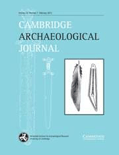
CAMBRIDGE ARCHAEOLOGICAL JOURNAL
Revealing Stories Through Archaeological ExcellenceThe Cambridge Archaeological Journal, published by Cambridge University Press, is a premier academic journal dedicated to archaeology and cultural studies. With an ISSN of 0959-7743 and an E-ISSN of 1474-0540, it has established itself as a leading platform since its inception in 1991, showcasing groundbreaking research that significantly contributes to our understanding of human history and cultural heritage. The journal currently ranks in the top quartile (Q1) across various categories, including Archaeology and Cultural Studies, underlining its impact and relevance in the field. The impact factor reflects its esteemed position, with Scopus ranks placing it within the 90th to 93rd percentiles among its peers. Researchers, professionals, and students alike benefit from its insightful analyses and interdisciplinary approaches, making it an essential resource for advancing knowledge in archaeology and related fields. The journal is based in the United Kingdom, at the Edinburgh Building, Shaftesbury Rd, CB2 8RU, Cambridge, England, and continues to drive scholarly conversations through its commitment to excellence and innovation in archaeological studies.